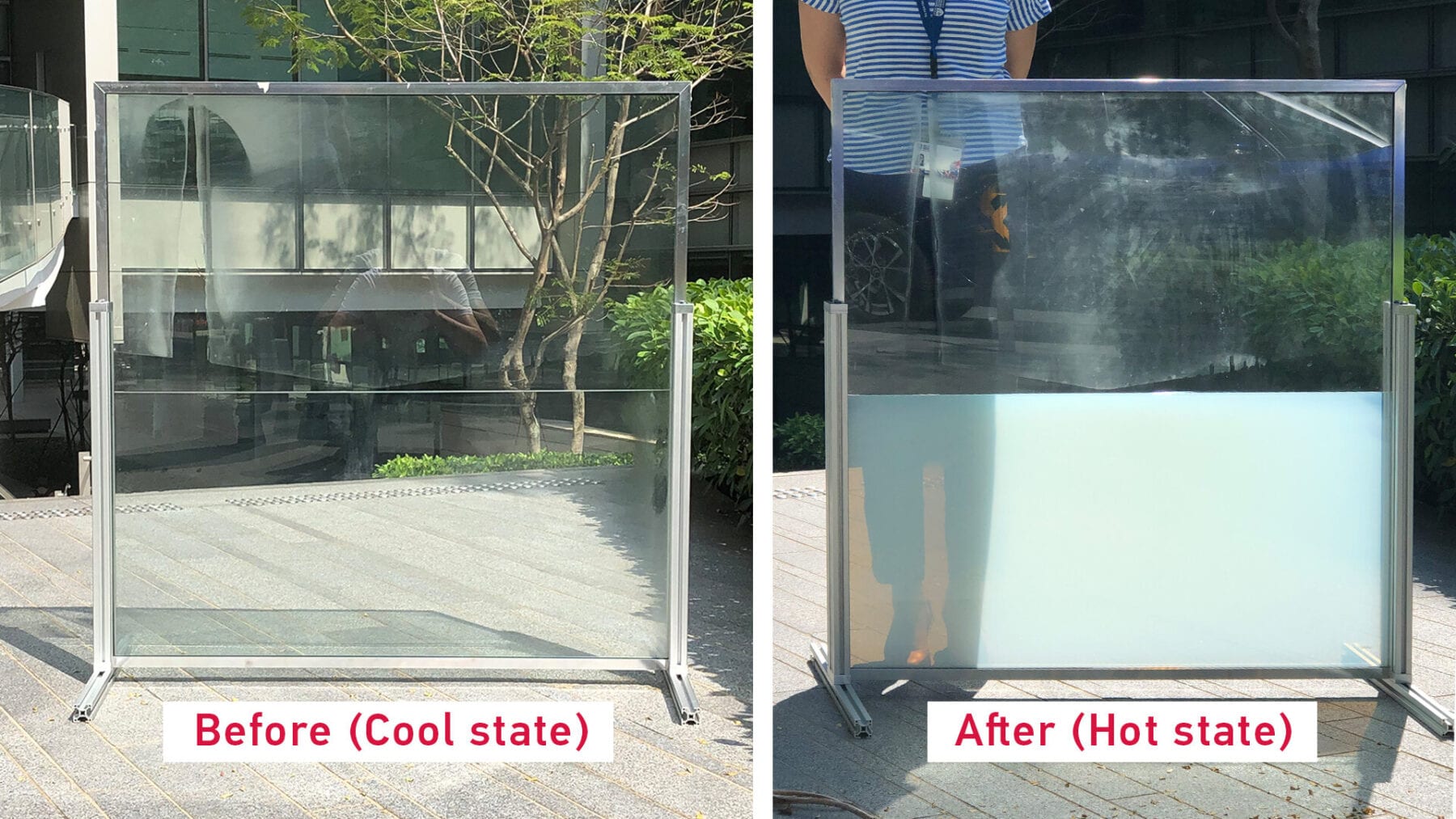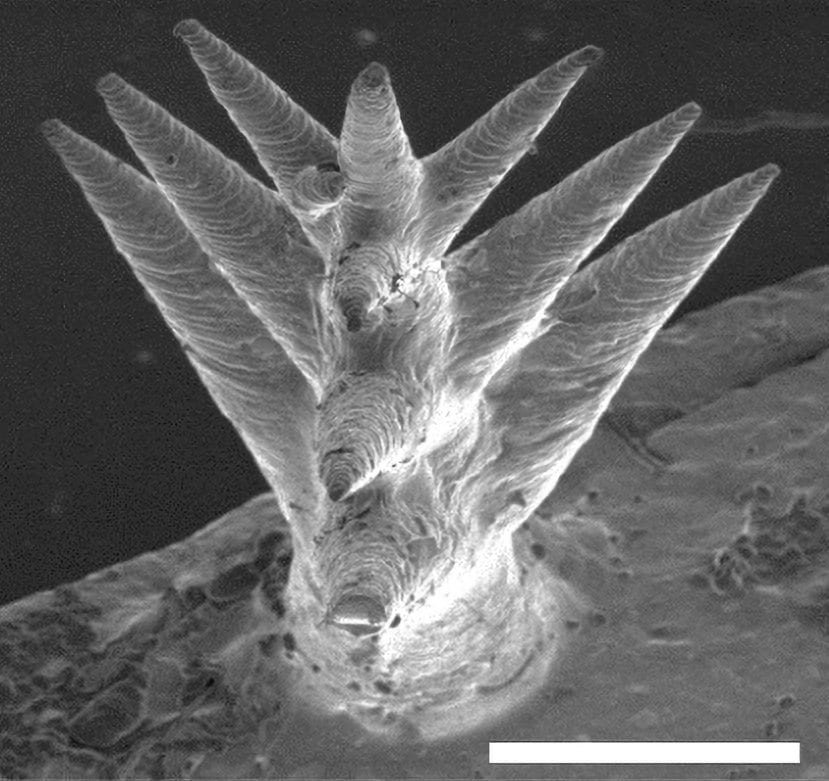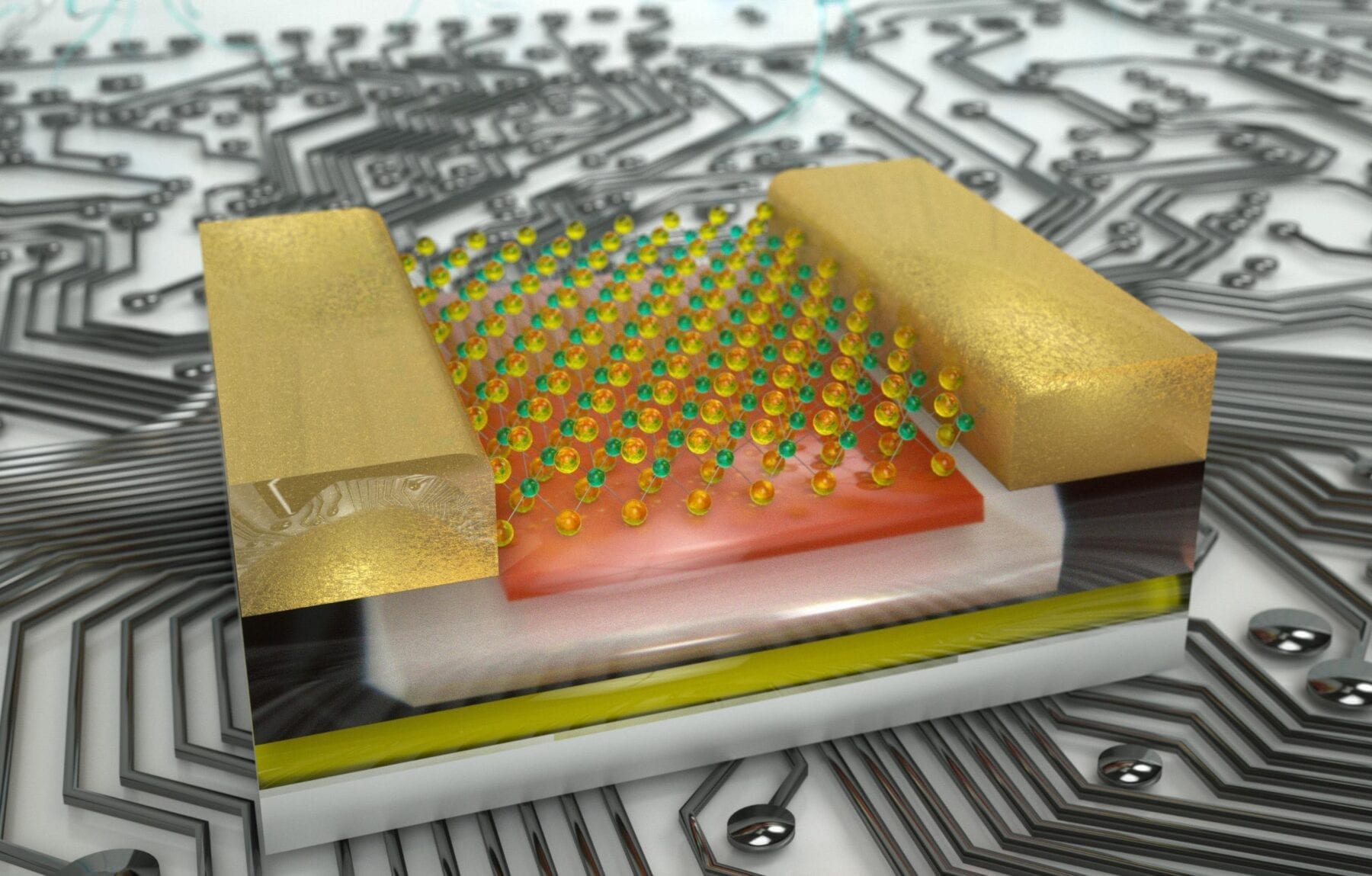
via Nanyang Technological University
Scientists at the Nanyang Technological University, Singapore (NTU Singapore) have developed a liquid window panel that can simultaneously block the sun to regulate solar transmission, while trapping thermal heat that can be released through the day and night, helping to reduce energy consumption in buildings.
The NTU researchers developed their ‘smart window’ by placing hydrogel-based liquid within glass panels and found that it can reduce up to 45 per cent of energy consumption in buildings in simulations, compared to traditional glass windows. It is also around 30 per cent more energy efficient than commercially available low-emissivity (energy-efficient) glass, while being cheaper to make.
The ‘smart window’ is the first reported instance in a scientific journal of energy-saving smart windows made using liquid, and supports the NTU Smart Campus vision which aims to develop technologically advanced solutions for a sustainable future.
Windows are a key component in a building’s design, but they are also the least energy-efficient part. Due to the ease with which heat can transfer through glass, windows have a significant impact on heating and cooling costs of a building. According to a 2009 report by the United Nations, buildings account for 40 per cent of global energy usage, and windows are responsible for half of that energy consumption.
Conventional energy-saving low-emissivity windows are made with expensive coatings that cut down infrared light passing into or out of a building, thus helping to reduce demand for heating and cooling. However, they do not regulate visible light, which is a major component of sunlight that causes buildings to heat up.
To develop a window to overcome these limitations, the NTU researchers turned to water, which absorbs a high amount of heat before it begins to get hot – a phenomenon known as high specific heat capacity.
They created a mixture of micro-hydrogel, water and a stabiliser, and found through experiments and simulations that it can effectively reduce energy consumption in a variety of climates, due to its ability to respond to a change in temperature. Thanks to the hydrogel, the liquid mixture turns opaque when exposed to heat, thus blocking sunlight, and, when cool, returns to its original ‘clear’ state.
‘Liquid window’ most suitable for office buildings
At the same time, the high heat capacity of water allows a large amount of thermal energy to be stored instead of getting transferred through the glass and into the building during the hot daytime. The heat will then be gradually cooled and released at night.
Dr Long Yi, lead author of the research study published in the journal Joule, and Senior Lecturer at the School of Materials Science & Engineering said, “Our innovation combines the unique properties of both types of materials – hydrogel and water. By using a hydrogel-based liquid we simplify the fabrication process to pouring the mixture between two glass panels. This gives the window a unique advantage of high uniformity, which means the window can be created in any shape and size.”
As a result of these features, the NTU research team believes that their innovation is best suited for use in office buildings, where operating hours are mostly in the day.
As a proof of concept, the scientists conducted outdoor tests in hot (Singapore, Guangzhou) and cold (Beijing) environments.
The Singapore test revealed that the smart liquid window had a lower temperature (50°C) during the hottest time of the day (noon) compared to a normal glass window (84°C). The Beijing tests showed that the room using the smart liquid window consumed 11 per cent less energy to maintain the same temperature compared to the room with a normal glass window.
Smart window shifts electricity load peak, blocks noise
The scientists also measured when the highest value of stored thermal energy of the day occurred.
This ‘temperature peak’ in the normal glass window was 12pm, and in the smart liquid window was shifted to 2 pm. If this temperature peak shift is translated to a shift in the time that a building needs to draw on electrical power to cool or warm the building, it should result in lower energy tariff charges for users.
Simulations using an actual building model and weather data of four cities (Shanghai, Las Vegas, Riyadh, and Singapore) showed that the smart liquid window had the best energy-saving performance in all four cities when compared to regular glass windows and low emissivity windows.
Soundproof tests also suggested that the smart liquid window reduces noise 15 per cent more effectively than double-glazed windows.
First author of the study Wang Shancheng, who is Project Officer at the School of Materials Science & Engineering said, “Sound-blocking double glazed windows are made with two pieces of glass which are separated by an air gap. Our window is designed similarly, but in place of air, we fill the gap with the hydrogel-based liquid, which increases the sound insulation between the glass panels, thereby offering additional benefit not commonly found in current energy-saving windows.”
The other first author, Dr Zhou Yang was a PhD student in NTU and is currently an Associate Professor at China University of Petroleum-Beijing (CUPB).
Providing an independent view, Professor Ronggui Yang, of the Huazhong University of Science and Technology, China, a recipient of the 2020 Nukiyama Memorial Award in Thermal Science and Engineering and an expert in thermal and energy systems said, “This is the first instance of a hydrogel-based liquid smart window, and it takes us far from a conventional glass design. The disruptive innovation leads to solar regulation and heat storage, which together render outstanding energy-saving performance.”
The research team is now looking to collaborate with industry partners to commercialise the smart window.
The Latest Updates from Bing News & Google News
Go deeper with Bing News on:
Liquid window
- Bird-Safe Penn State: How to Help Reduce Window Collisions on Campus
While there are a number of factors that human civilization has introduced to impede their journey (like habitat loss, outdoor cats or bright lights at night) there is one major factor that actually ...
- Anthropic’s Claude Teams and iOS App: The secure, scalable solution for enterprise AI adoption
The Teams plan provides enterprise customers with increased usage limits, access to the full suite of Claude models, support for larger context windows, and administrative tools for overseeing usage ...
- How to Stop Birds From Pecking at Your Window
During mating season, male birds will seek to claim the best nesting spots, and your window sill might seem like a nice location—until the window becomes reflective, and that male bird sees his ...
- As winter approaches, Mr Blinds share how the right window treatments can help keep homes warm and energy-efficient
As homeowners prepare for the colder months ahead, Mr Blinds, one of New Zealand’s most trusted manufacturers of custom blinds and curtains, is ...
- Introducing iMazing 3 for macOS & Windows
DigiDNA is excited to announce the release of iMazing 3 for macOS and Windows, a brand new version of the world's premier iPhone ...
Go deeper with Google Headlines on:
Liquid window
[google_news title=”” keyword=”liquid window” num_posts=”5″ blurb_length=”0″ show_thumb=”left”]
Go deeper with Bing News on:
Smart window
- What Is a Smart Thermostat?
A smart thermostat connects to your Wi-Fi, using the internet and other features to optimize your HVAC system's performance automatically.
- Sinter Smart Bedding Machine Promises 20% Better Braking Performance
Sinter makes quick work of bedding in new rotors and brake pads with their new machine, saving bike shops time and effort.
- Samsung Announces Future Smartwatch And Smart Ring Plans
Samsung has teased its future wearable plans for the Samsung Galaxy Ring and Galaxy Watch 7 as part of its latest financial reporting.
- Smart Hospitals: Digitalizing Healthcare For A New Era
Faced with the need to be optimally efficient, retain staff and become more sustainable, digitalization can help hospitals make the most of their available resources.
- These Smart Devices Make Bird Watching Better
There are apps are available to identify birdsong, and devices like Haikubox that monitor your yard 24/7 and ID birds. Smart birdhouses also ID birds, and get snapshots and video for sharing. There ...
Go deeper with Google Headlines on:
Smart window
[google_news title=”” keyword=”smart window” num_posts=”5″ blurb_length=”0″ show_thumb=”left”]










